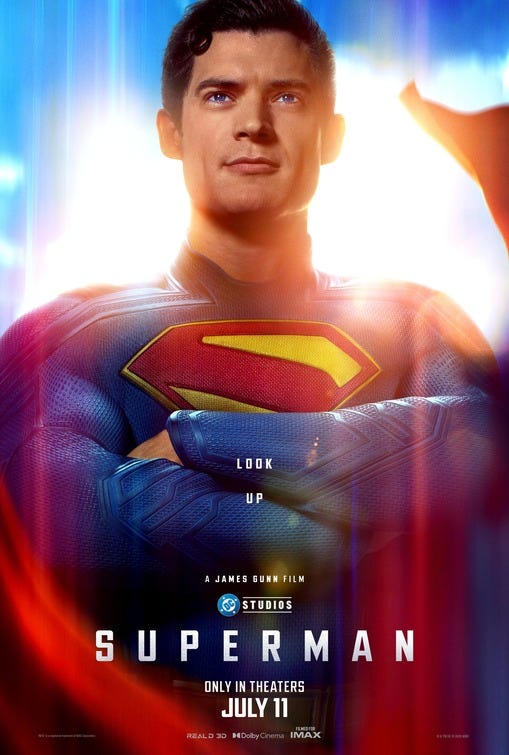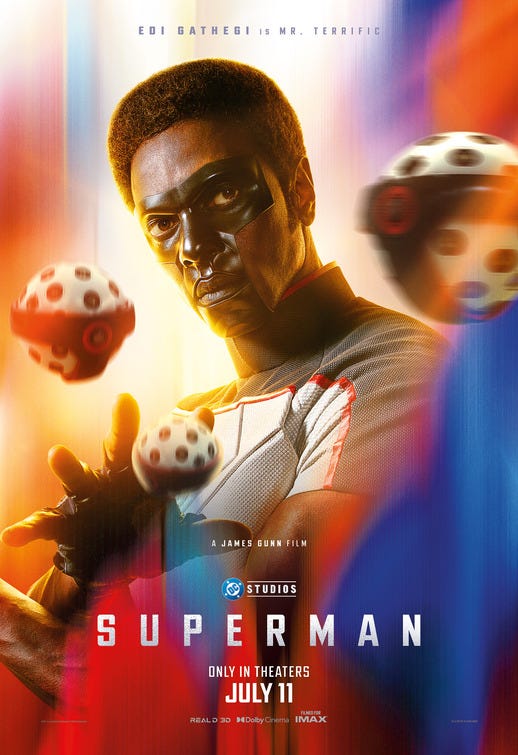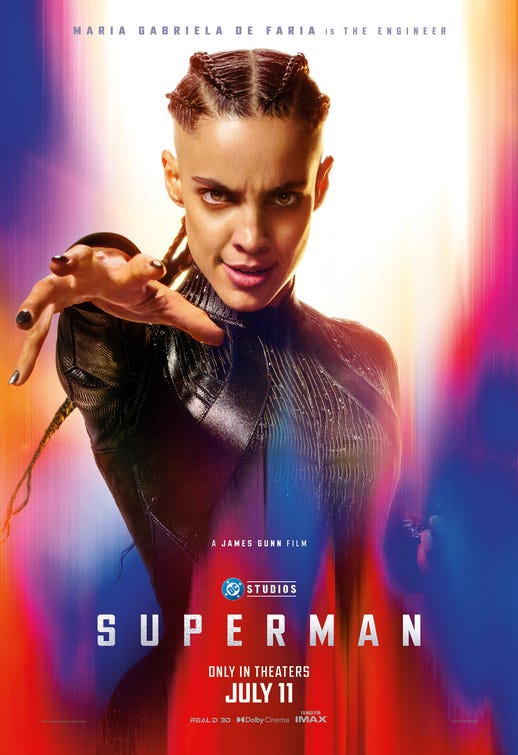James Gunn's Goofy, Reverent Take on Superman Is Both Spectacularly Silly and Surprisingly Sincere
Like the Star Wars films, Superman has an intensely bifurcated identity. Some see Star Wars and Superman as goofy, lightweight entertainment for children and families. Others see the American institutions as something approaching sacred. For these excessively intense true believers, Superman and Star Wars aren’t mere entertainment: they’re something closer to a religion, or at least a cult.
Zack Snyder sees Krypton’s most famous exile as a Christ figure in films that aren’t just serious: they’re dour. They’re grim. They take perverse pride in not being any goddamn fun at all.
That resonated with cultists who similarly take comic books and superheroes very seriously and are insulted by the idea that entertainment about a handsome space alien who flies around in his underwear, saving people, should be fun instead of as brutal as a Holocaust drama involving children.
These folks are known and revered as “Snyder Bros.” They’re the most respected group of pop culture enthusiasts this side of Juggalos.
James Gunn enraged these irritable man-babies by making a Superman movie that’s goofy rather than grim, that sets out to entertain the masses rather than punish them for their sins.
We live in a hyper-partisan world where right-wing bros take personal offense at a movie not explicitly made for them. For these brittle souls, diversity is not a strength but a crime.
Superman hearkens back to the wholesome, All-American spectacle of Richard Donner’s wildly influential 1978 adaptation of the comic book, the Big Bang for comic book movies.
Gunn’s movie sparked a backlash when it replaced, “You’ll believe a man can fly”, the legendary tag-line of Donner’s classic, with the more provocative, “You’ll believe a cis immigrant who identifies as male and uses he/him pronouns can become a woke intersectional feminist.”
“Superman” has become shorthand for invulnerability, but Gunn gives us a superhero who is perpetually getting his ass kicked. As played by David Corenswet, Clark Kent/Superman is a figure of intense vulnerability.
The people need Superman to save them from various threats, alien and otherwise, but also as a symbol and an ideal. Superman embodies hope. We’ve never needed it more than we do now.
In Superman, the super-powered protagonist embodies everything good and decent about our country and its inhabitants, which has led to it being derided as Marxist propaganda for hysterics who are downright Joseph McCarthy-like in their ability to ferret out Communist plots where none exist.
It’s gotten so bad that entertainment that preaches kindness, compassion, tolerance, and basic human decency is seen by much of the population as radical lefty propaganda.
Superman distinguishes itself from previous takes on the material by not being an origin story. At this point, everyone knows how a baby fleeing a dying planet became our greatest hero while simultaneously pursuing a modest career in print journalism.
So Gunn skips the preamble and opens with an adult Superman (David Corenswet) bleeding on the ground. Superman spends much of the film horizontal and hurt.
In desperation, Superman calls for super-dog Krypto to save him by dragging his bruised and battered body to the Fortress of Solitude, where he is repaired with the help of a robot voiced by Alan Tudyk, who manages to simultaneously be polite and callous in his cold-bloodedness.
Krypto has not appeared in previous Superman films for a very good reason: he’s goofy as hell. Krypto’s troublemaking, scene-stealing presence alone ensures that Superman will aggressively eschew the solemnity of Zack Snyder.
To the Snyder bros, having Superman tolerate a rambunctious pooch is akin to a version of the New Testament where Jesus has an adorable teacup Yorkie named Butterbean —a little on the heretical side.
I love Krypto. I hate crypto. Movie posters sometimes feature an image of a cute and/or sassy dog, sometimes with sunglasses or a cigar, even if there are no canines in the movie. That’s because the public is so crazy about dogs that their mere presence is a commercial draw.
If you want audiences to like a character, make them dog-like. That’s a big part of the reason Stitch of Lilo and Stitch fame is so popular. Even Jurassic Park: Rebirth introduced a tiny little dino named Delores that behaved like a pooch and instantly emerged as the film’s most likable character.
Superman focuses on an evil, power-mad billionaire motivated by hatred and greed who forms an alliance of convenience with a corrupt Eastern European strongman.
Nicholas Hoult’s Lex Luthor cuts a distinctly Elon Musk-like figure. He’s a narcissist with a Tom Cruise vibe who has chosen to use his power, fortune, and influence for evil rather than good. Lex Luthor single-handedly makes the world a worse place.
The bald super-villain penetrates the Fortress of Solitude and accesses a message from Superman’s parents that he has kept and cherished as a sacred link to his parents and his home planet.
Our hero is mortified to learn that the scrambled part of the message finds his parents encouraging their son to use his superior intellect and powers to rule humanity, rather than serve it.
If I might get into spoiler territory here, I spent the entire film thinking that the “Control these puny man-animals with your awesome power” was obviously a fake message designed to make Superman, and by extension ALL exiles from Krypton, look bad.
I was consequently surprised when that didn’t happen. Superman isn’t just a good guy; he’s literally the Superman. He’s the best guy, but his mom and dad have some issues.
Superman courts controversy by personally intervening in an Eastern European war whose parallels with the Ukraine/Russia conflict are hard to ignore or overlook.
The American people are a force for good and for evil. They’re suggestible and easily manipulated. When the masses are told that Superman is a hero, they revere him. They look up to him, literally and figuratively. When they’re encouraged to see him as a monster and a threat to the established social order, they turn on him almost instantly.
The metahuman, sometimes known as Clark Kent, is an illegal alien in the most literal sense. He’s from another planet and did not take the steps to become a legal citizen of our country.
However, I did find it a little on the nose when Lex Luthor accused Superman of being an MS-13 gang leader and said that Superman was “eating the super-dogs,” “eating the super-cats,” and “eating the meta-nonhumans.”
Superman isn’t the only metahuman on this rotten planet. He’s assisted in his world-saving endeavors by a funky trio that calls themselves the Justice Gang until they can think of a better name.
Nathan Fillion audaciously portrays Guy Gardner/Green Lantern as an asshole with a bowl cut, more concerned with public opinion than actually serving the public. It’s an irreverent performance in a movie that’s reverent by Gunn’s smart-ass standards.
Isabela Merced makes less of an impression as Hawkgirl/Kendra Saunders, though she isn’t given much to do. That thankfully is not true of Edi Gathegi as Mister Terrific. I knew Gathegi exclusively from his performance in 2015’s Criminal Activities.
Gathegi’s mesmerizing turn in Criminal Activities made me an instant fan. The Kenyan-born actor makes Mister Terrific the most fascinating metahuman in the movie. He plays Mister Terrific as a scientific super-genius with a funky blaxploitation vibe and pleasing hints of neurodivegence.
Mister Terrific is smart even by superhero standards. It’s a star-making performance that benefits from Gunn including semi-obscure heroes and villains out of a deep love and understanding of comic books as a medium, not because a studio executive told him he needs to set up Hawkgirl and Mister Terrific solo adventures.
With Superman, James Gunn uses art and entertainment to comment on society and address contemporary issues. That is both unethical and illegal and should lead to Gunn being tarred and feathered and imprisoned.
Superman is a profoundly personal, massive commercial endeavor. It’s simultaneously spectacularly silly and surprisingly sincere. Superman has fun with the surreal absurdity of the comic book world, but on a fundamental level, it believes in Superman with a childlike sense of wonder that makes us believe in him as well.
The only place where the goofiness does not work is in Superman’s anxiety about what people are saying about him online. Movies generally do not benefit from references to social media. Superman is no exception.
Gunn trades in transgression, edge, and attitude with unexpected earnestness. Superman brings out the idealist in Gunn, whose brand of patriotism the right sees as treasonous weakness since it is rooted in service and compassion rather than arrogance and xenophobia.
For all of the debate it has inspired, Superman is ultimately just a movie. It’s not scripture. It’s not sacred. It’s entertainment for the whole family. At least it’s a good movie from a man who understands superheroes and comic book movies better than anyone alive.
Other than Zack Snyder, of course.
3.75 stars out of 5
















Enjoyable review, Nabin. I don't partocularly have any opinions on Superman, but I hope this movie is reasonably good, as one hopes most things will be good. Maybe I'll see it and maybe I won't. I miss a lot of perfectly good movies.
At the risk of getting off on a rant and unfairly pitting people against one another, there's a reason I come here and read reviews moreso than any other site. As well-equipped as you are to tackle trash that wasn't going to be any good, you are uniquely in touch with what makes movies enjoyable and fun. You have a common touch that is increasingly rare in critical spaces (and I say this knowing -- hell, embracing -- the fact that you pepper reviews like this with sociopolitical clowning commentary that will inherently rankle people.)
Thank you for doing what you do.
I'm only worried I'm hyping the film up too much in my mind because everyone I respect has told me the film is wonderful.